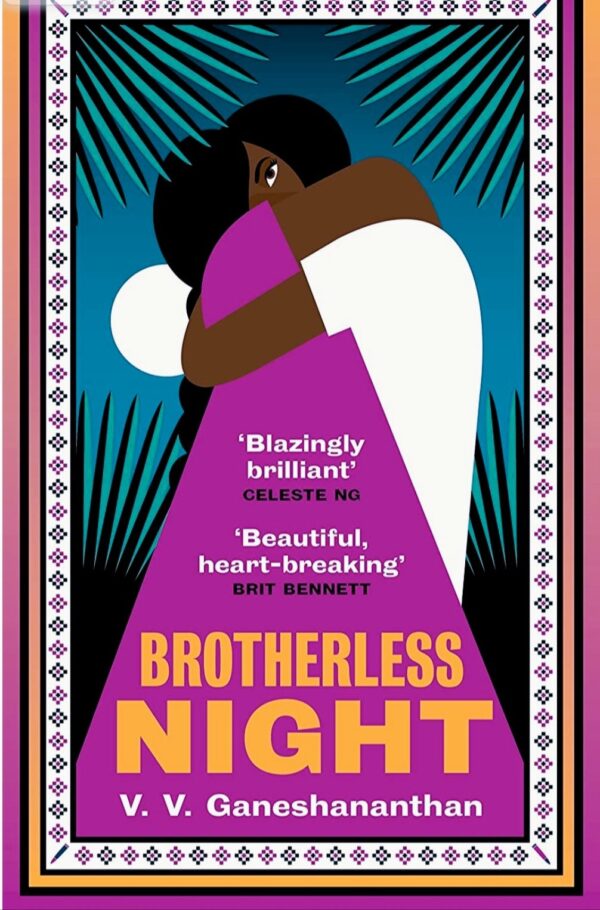Brotherless Night by V.V. Ganeshananthan. Manhattan: Random House, 2023
Reviewed by Vasugi Kailasam
Brotherless Night is V. V. Ganeshananthan’s second novel. I read this novel in late July 2023, with a fevered reminder of the commemoration of the 40th anniversary of Black July in Sri Lanka. The reading was a moving exercise that prompted me to pause and reflect on the fractured nature of modern Tamil identities, and ther enduring legacy of violence and dislocation following independence from the British. In contrast to Ganeshananthan’s first novel, Love Marriage, which is set within the North American diaspora, this book firmly places itself in the heartland of the Tamil experience in 1980s Jaffna.
Beginning in 1982, the years before the ethnic conflict became militarised, Ganeshananthan chooses to narrate the tale in a realist mode that allows the text’s space to be experienced as a realm of overlapping and repeating memories, with both first- and third-person narration, thus creating unstable realities for the reader.
Narrated by 16-year-old Sashikala Kulenthiren, an aspiring medical student, Brotherless Night commences in the aftermath of the burning of the Jaffna public library. This library serves as a gathering place for Sashi and her four brothers—Niranjan, Dayalan, Seelan, and Aran—to study and connect with peers. The destruction of the library, leads to the politicisation of Tamil identities and irreversibly alters Sashi’s idyllic household. Her brothers Dayalan and Seelan join the cause of Tamil militancy. Niranjan, her eldest brother and a medical doctor, is killed in the July riots of 1983.
The central plot revolves around Sashi’s relationship with ‘K’ (modelled after Thileepan, a popular LTTE leader), a connection that begins as a teenage crush and evolves into a relationship that falls somewhere between platonic and romantic, prompting her to reflect on her evolving feelings about Tamil separatism and politics. K’s portrayal as a rebellious young Tamil man who reluctantly embraces violence and its consequences while conforming to the militant cause is rendered with empathy.
Against this backdrop, Ganeshananthan depicts the fragmented nature of Tamil militancy and its ideals, with the Tamil Tigers overtaking other Tamil militant movements and positioning themselves as the sole representatives. Framing her narrative in this manner, Ganeshananthan’s novel explores two aspects: the challenges and ambiguities of intimate friendships and solidarities during times of militant and State violence, where labels like ‘terrorist,’ ‘traitor,’ and ‘martyr’ become commonplace; and on the other hand, the experience of terror and atrocities that are deeply traumatic, but nevertheless remain unaddressed to this date through legal or political means.
Ganeshananthan is acutely aware of the responsibilities and challenges inherent in her narrative project and navigates these issues skilfully and with the adeptness of masterful storytelling, employing sensitive characterisation.
Brotherless Night stands as an exemplary text in its attempt to shed light on the lesser-explored aspects of the war and how it is remembered, uncovering stories of women and their experiences of displacement and violence during this tumultuous era.
Whether through the depiction of Sashi’s soft-spoken mother who loses her sons one by one to the conflict, or through the outspoken critic Anjali Premachandran (modelled after another historical figure, Rajini Thiranagama), Ganeshananthan reminds us that the impact of militarisation and a political structure enforced by arbitrary and clandestine violence, subject women to everyday suffering that is inherently gendered.
One of the remarkable strengths of this novel is its portrayal of Tamil life during the politically charged decades of the civil war. In contrast to other recent English novels set in Sri Lanka, Brotherless Night adeptly maintains its Tamilness while being written in English. The characters’ dialogues, often crafted in the cadence of Jaffna Tamil, contribute to this sense of authenticity. This achievement is evident across various dimensions, including the insightful references to the characters’ reading materials, such as the shift from popular Tamil romance novels like Ponniyin Selvan, imported from Tamil Nadu, to more politically charged titles of Russian literature, which served as inspiration for a vibrant social realist canon within the Sri Lankan Tamil literary tradition, such as Maxim Gorky’s Mother, translated as ‘Amma’ in Tamil. Through these literary nuances, Ganeshananthan deftly infuses the text with skilful Tamil cultural specificity.
Brotherless Night emerges as a novel of profound importance, chronicling the social ramifications of the Sri Lankan civil war’s mass displacement through the lens of civilian experiences. As Ganeshananthan deftly guides readers through the tumultuous three-decade-long conflict, her focus on individual subjectivities provides a poignant and lasting contribution to modern Sri Lankan literature.
Vasugi Kailasam is Assistant Professor at the Department of South and Southeast Asian Studies of the University of California, Berkeley.

